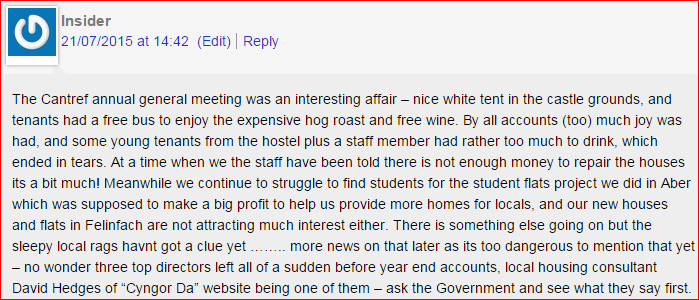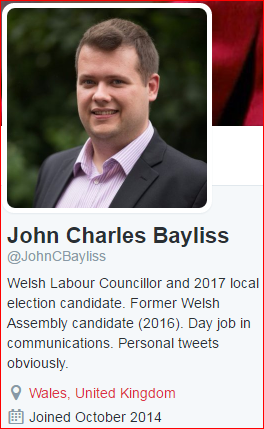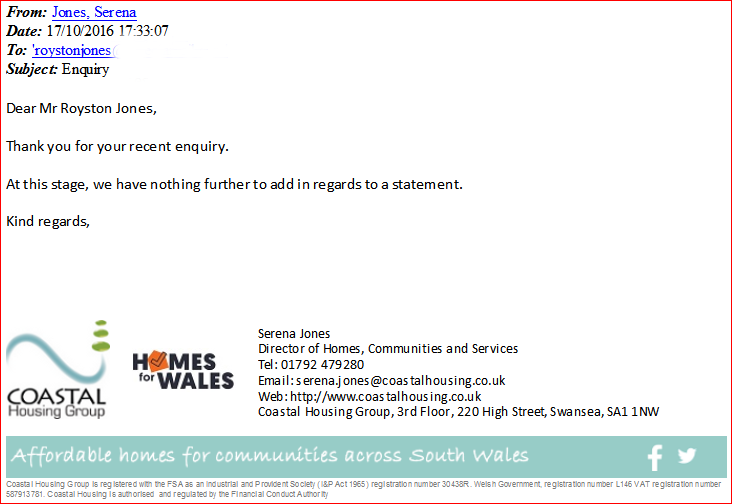![]() Some seven years ago I wrote about a company called Link Holdings (Gibraltar) Ltd. It was difficult to get to the bottom of it all because the companies involved were registered offshore.
Some seven years ago I wrote about a company called Link Holdings (Gibraltar) Ltd. It was difficult to get to the bottom of it all because the companies involved were registered offshore.
It all started when it was brought to my attention that properties in Swansea used by housing associations were leased or rented from Link. After a bit of digging I was satisfied that, in various forms and under different names, Link had been operating in and around Swansea, and across the south, for decades.
But, as I say, due to the various entities being offshore, and information hard to come by, there was a limit to how far I could go. In the end I just had to leave it and move on.
Even so, to help you understand better what you’re going to read, and for me to avoid repeating myself too much, I suggest you read the piece from 2016.
◊
THE LEASEHOLD SAGA
We are going to deal with an issue that’s been rumbling on for a long, long time; with politicians of all stripes promising to tackle it. For those unclear what I’m talking about, the leasehold system is explained here.
Here’s George Thomas demanding change in 1961, in a surprisingly impressive speech (considering who’s making it). Nothing happened.
Leasehold is again discussed in a 1985 parliamentary exchange between Ron Davies MP and Nick Edwards, Secretary of State for Wales.

To bring us up to date, Labour promises to abolish leasehold within 100 days of winning the next UK general election. The wording of the article suggests the proposed legislation will also cover Wales.
Which would of course save the so-called ‘Welsh Government’ from having to do anything. Though it might have some powers now.
I say that because the ‘Welsh Government’ has given thought to leasehold. Here’s a July 2019 report, Residential Leasehold Reform, from a task and finish group.
With the quote below from page 29, made in March 2018 by the Minister for Housing and Regeneration, Rebecca Evans.

But this report from March 2021, despite containing ‘next steps’ in the title, suggests that ‘Welsh Government’ is just kicking the can down the road.
In fairness, and as I’ve suggested, leasehold reform might be an Englandandwales matter; but if so, it hasn’t stopped Corruption Bay from creating the post of Head of Leasehold Reform. Does that job title suggest he has staff!

You won’t be surprised to learn that this job went to an insider. His name is Timothy Mann, formerly with the Labour party’s favourite housing association, Wales & West.
But FFS! If ‘Welsh Government has the power to act on leasehold, then why doesn’t it? But if it doesn’t have the power to act then why waste time and money faffing about with task and finish bullshit and sinecures for cronies?
It would appear that Labour in Wales has rowed back from outright opposition to leasehold to merely being against the sale of leases on new-build properties.
One reason might be Registered Social Landlords (housing associations), which are funded by the ‘Welsh Government’. For since their privatisation in 2018 many, perhaps most, have set up subsidiaries, which now build private housing for the open market . . . often leasehold, or ‘shared ownership’.
Also, and as I reported in the 2016 piece, housing associations are quite happy to lease property from Link Holdings (Gibraltar) Ltd, and perhaps other companies. With the ‘Welsh Government’ fully aware of this.
To make sense of it, understand that housing associations, especially in the urban south, are extensions of the Labour party. So if housing associations are doing lots of business with leasehold firms, or selling leaseholds themselves, then this might explain why ‘Welsh Government’ is reluctant to implement leasehold reform.
But if intervention comes from the next Labour government in London then the bruvvers down here can hold their hands up and say, “Nothing to do with us“.
OK, that’s a more general picture on leasehold, time now to turn to the latest news about Link Holdings (Gibraltar) Ltd, and what I’ve unearthed.
◊
WHY I’M REVISITING THE SUBJECT
This return to Link Holdings (Gibraltar) Ltd was prompted by an e-mail I received last week. Let the senders explain with this extract from that e-mail.

You must admit, it’s a worrying tale. If the couple that wrote to me hadn’t opened the innocuous-looking letter from Companies House they might have lost their home.
You’ll see Castlebeg mentioned, that we encountered earlier in the Davies-Edwards House of Commons exchange. This was another horse out of the Link stable, based in Jersey. I use the past tense because the company’s dissolved.
Also based in Jersey were Cymru Management Ltd and Cymru Investments Ltd, both of which were connected with Link Holdings. The former has filed nothing since January 2021, and the latter was dissolved in September of that year.
Was this in anticipation of the new legislation you’ll soon be reading about?

And yet . . . another document I unearthed, for a UK-registered company owned by the family I believe is behind Link Holdings, suggests there is still a company using the ‘Gwalia’ name. This document is dated 24 January 2023.

The Cymru Investments Ltd just mentioned was once known as Gwalia Investments Ltd, but the name changed many years ago. The date of the filing above suggests an active company. But in which jurisdiction?
Let’s return to the reason for this update.
Here’s the title document sent by my source (already highlighted.) I’ve made redactions for obvious reasons but you can see that in January, this property, for which both leasehold and freehold had been purchased by my contacts, was still, according to the Land Registry, owned by Link Holdings (Gibraltar) Ltd.
There are other title numbers mentioned on the document I’ve just linked to, and these refer to a property on Neath Road in Plasmarl. The freehold is held of course by Link, but the leasehold by Caredig Housing Association. Again, we see a connection between Link and a housing association.
Anyway, after reading and digesting the information I’d been sent, it was time to make fresh enquiries into Link, maybe pick up where I’d left off in 2016.
◊
BACK ON THE TRAIL
The first stop was Companies House. And there, against my expectations, I found Link Holdings (Gibraltar), registered as an Overseas Entity 23 November 2022. The only officer / director listed is Sovereign Fiduciary Directors Ltd of Gibraltar.
This registration with Companies House ties in with the Register of Overseas Entities legislation that came into force 1 August 2022, demanding that . . .
Overseas entities who want to buy, sell or transfer property or land in the UK, must register with Companies House and tell us who their registrable beneficial owners or managing officers are.
There’s nothing really to see on the Companies House entry apart from the Registration document itself (OE01). Though it is quite revealing. For if you scroll down to ‘Part 13 Disposal of land’, you’ll hit a few pages of Land Registry title numbers.
Forty-nine titles in all. From my quick dip I’m guessing that most if not all of them are ‘multiples’, covering a number of properties, with a total running into the hundreds.
It would have been too much work, and too expensive, to check them all; so with each page containing 8 titles I settled for one from each page.
Despite being chosen at random, all were in the Swansea area, the furthest out being Ammanford. The others in Penclawdd, Sketty, Waunarlwydd, and Dunvant.
The first we’ll look at is Ammanford, 9 properties on Maes yr Hâf, off Dyffryn Road. Here’s a view. Next, Penclawdd. Twenty-two properties at a new development on the Gowerton Road.
Sketty is 16 properties on an older development. There seem to be 8 properties in the Waunarlwydd development. Finally, at Dunvant, we find (by my figuring) the title covering 35 separate properties. I won’t link to the title document because lessees are named. These properties are scattered about on Hendrefoilan Road, Derlwyn, Gwelfor, and a few other nooks and crannies.
All the Killay / Dunvant properties would seem to be covered by this map.

That’s a total of 90 properties on five randomly chosen Link Holdings titles.
And remember, these are just the titles disposed of between 28 February 2022 and the dates of the application, the latest of which was 7 November 2022. There will be many, many more titles held by Link.
For example, the Hirwaun title that started the ball rolling again is not listed.

To give some understanding of how much property Link owns go to Private Eye‘s Tax Haven map. Or try the Excel database (the link for this is just above the map). Admittedly, these only go up to 2014, but they’re revealing; and this research helped bring about the law to register overseas entities owning UK property.
Open the Excel file and, even though there are many Link properties before, and after, if you start at 73397 (left-hand column) you’ll hit a long sequence of Link properties due to the ‘WA’ Land Registry prefix.
Most seem to be in the Swansea area, but they’re spread across the south (with the exception of Blaenau Gwent), though perhaps no further west than Llanelli.
If you’re smart enough with Excel then you can probably extract all the Link properties from the document. (In fact, I’d appreciate it if someone could do that.)
The area we’re looking at next is north east Swansea, either side of the M4. The properties in orange in the Private Eye map on the left are relatively new and all Link Holdings leaseholds.

Funny, isn’t it? ‘Welsh Government’ says it’s opposed to new builds being leasehold, but this seems to be exactly what Link’s been doing for decades.
UPDATE: Thanks to some outside help Link Holdings’ Welsh titles have been extracted from the PE data and arranged in local authority order.
◊
POACHER TURNS GAMEKEEPER (SORT OF)
If you look at the Land Registry title documents I’ve used in this article you’ll see addresses given on the first page, against ‘Registered owners’. Link Holdings is obviously listed but beneath the company name the contact details given are:
Sovereign Fiduciary Services Ltd, Po Box No 564,
Sovereign Place, 117 Main Street, Gibraltar, GX11 1AA
107 Charterhouse Street, London EC1M 6HW
3rd Floor, 11-12 Wind Street, Swansea SA1 1DP
The Gibraltar address is obviously Link’s representative on The Rock, but the other two are solicitors. One is Sayers Butterworth LLP in London, the other Smith Llewelyn in Swansea.
I saw no point in contacting Sovereign Fiduciary Services at its plush downtown offices. But I thought it might be worth approaching the solicitors, to see if they had anything to say about their client.
Quite a departure. It’s normally solicitors contacting me! “Oi! our client . . . “.
I sent each solicitor an e-mail, on Wednesday last week. But I’ve received no reply. I think they’re waiting to see what I write before contacting me.
I’m 90% sure I know who’s behind Link Holdings. It’s an established business family in Swansea. The name suggests their ancestors might have been part of the Cornish migration of the 18th and 19th centuries, following the tin and the copper to Swansea.
Though they seem to have deserted the City of My Dreams for Hampshire, Fulham, and God knows what other hell-holes!
My many admirers on the left might describe those behind Link as, “bloodsucking capitalists!“, or some other carefully-honed and rationally presented response such as we hear from the comrades nowadays.
But me, well, I see it differently. A moral and regulated capitalist system is the only way to create wealth and employment. With the prosperous and egalitarian democracy that results the surest guarantee against the extremes of left and right.
There’s more I could say about the leasehold model; for this throwback to feudalism should have been abolished a long time ago along with droit du seigneur.
Such as people contacting me who thought they’d bought their new house outright, only to discover the hard (and expensive) way that what they’d actually bought was a lease. Leasehold is a system that invites deception and corruption. It should be abolished.
But instead of signing off with a rant I’ve decided to wind up this wee opus with some harmless musing.
- How many others have found themselves in the position of my Hirwaun contacts, with Link Holdings claiming to own their home?
- How many others are in that situation without knowing it because they haven’t checked what’s filed with the Land Registry?
- Given that in recent decades Link has concentrated on new build properties, what is the company’s relationship with the builders involved? Is Link buying ‘off plan’? Or is Link commissioning the building of these developments in order to sell the leaseholds and retain the freeholds?
- What is Link’s relationship with Swansea council, which cannot be unaware of the company’s activities? What would the council say to those who’ve been denied the opportunity to buy a home outright by Link hoovering up the freeholds and only offering leasehold agreements?
- Labour has argued against the leasehold system for at least 60 years, yet in 24 years of devolution has done nothing. Is this another example of Labour making promises out of power and failing to deliver when it has power?
- Is the ‘Welsh Government’ comfortable with certain Welsh housing associations renting / leasing property from a company of unknown ownership hiding away in a tax haven?
♦ end ♦
© Royston Jones 2023






























